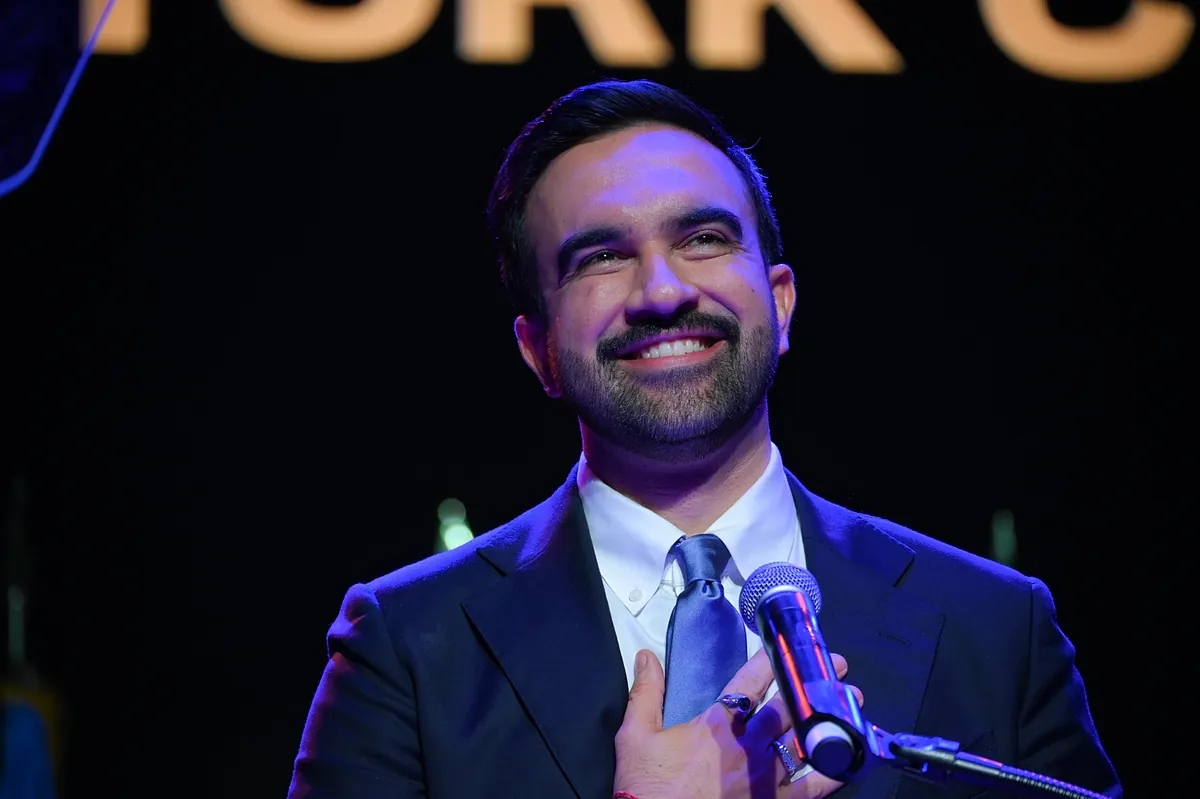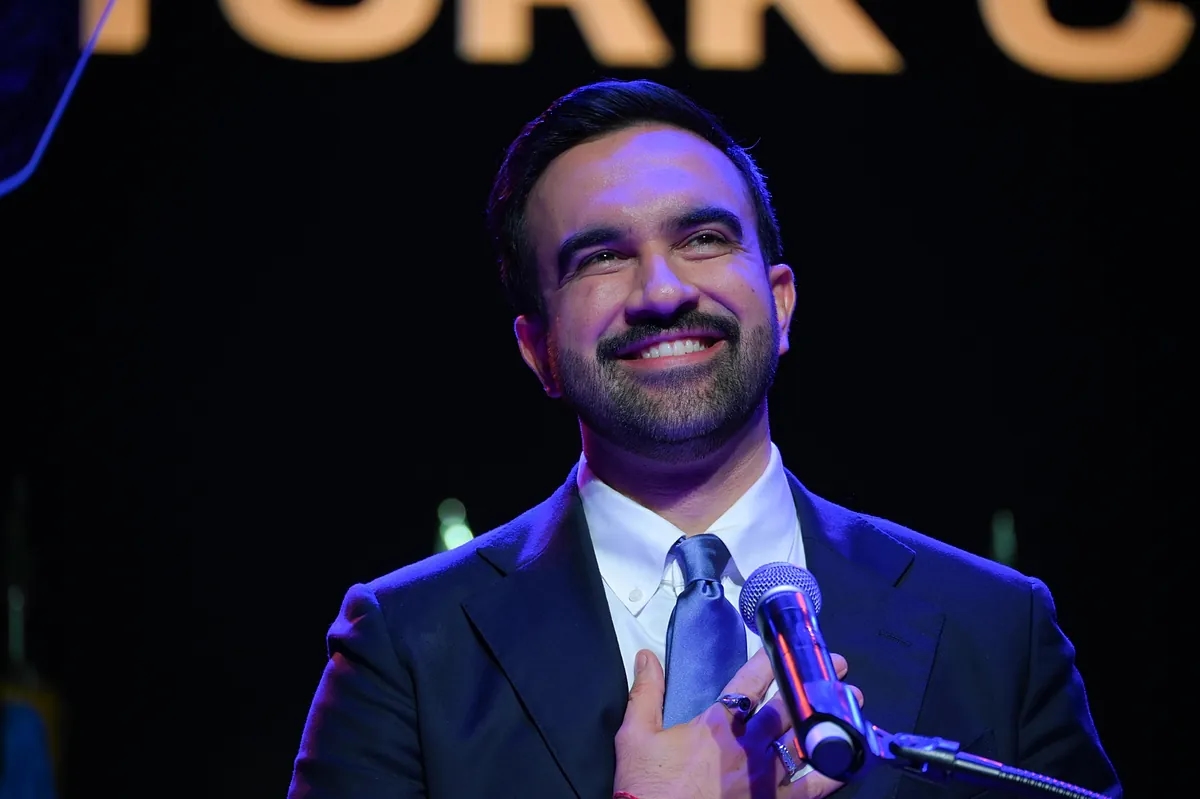Lessons from New York

Vladimir Putin and Xi Jinping, the besieged Nicolás Maduro, Kim Jong Un , who defends himself with his nuclear arsenal, and the other totalitarians of the world can all be pleased. So too, the masses of the world, with their disordered thinking, who rebel because contracts are worthless, housing is exorbitantly expensive, and the fortunes of algorithm tycoons insult their basic intelligence and sense of identity.
Something is very wrong in the mighty United States when the emblematic city of its liberal democracy, the nerve center of the global financial system and the vibrant metropolis that hosts the United Nations, elects as mayor someone whom the leader of the free world furiously denounces on social media from the White House he occupies in Washington as a "100 percent communist lunatic".
The cup of joy is certainly overflowing among Pedro Sánchez's fellow travelers on the progressive, anti-American march. Ada Colau will no longer be mayor of Barcelona, but a Muslim who accuses Israel of "genocide" in Gaza is now mayor of New York.
Zohran Mamdani 's victory in the city that never sleeps compensates for Donald Trump's win a year ago in the presidential election of the most powerful country in history. This is both reassuring and unsettling, depending on one's perspective.
From Korea to Venezuela, passing through China and Russia, the authoritarians in power hate one thing which is the freedom to cast a vote in a ballot box at an electoral college and cling to their conviction that liberal democracies are obsolete and have entered a phase of terminal decline.
In reality, totalitarians should be grateful to the ballot boxes of open societies. Today, in the age of populism and demagoguery, what should strengthen liberal democracies, on the contrary, reveals their weakness. And the decline begins when elites lose the touch that allows them to take the pulse of the society they govern and lose sight of the compass that guides them.
At the polling stations, wherever they are, voters show a desire to reject the old politics, and this is understood by both Donald Trump and Mamdani, his "lunatic" adversary who, when it comes down to it, is as expert as he is in the art of mobilizing primal feelings.
Both proclaim themselves outsiders, detached from the system, although, with similar success, one has spent his life in the real estate business and the other in the no less competitive world of municipal politics. One, who wants to deregulate in order to build buildings everywhere, is the complete opposite of the other, who wants to freeze rents and doesn't realize that this will only make housing more expensive.
The clash between the most populous city in the Union and the capital of the fifty states is not good for the United States , nor for its partners in the European Union, its NATO allies, Ukraine, which has been invaded by Russia, nor for Asians who fear China will absorb Taiwan. They all bow to Trump, and they all fear his unpredictable mood swings.
ObstinacyHowever, a majority of New Yorkers stood their ground. They ignored Trump's threats to cut federal funding if they voted for the man his inflammatory tweets accuse of being a dangerous leftist. Perhaps all his crude intimidation tactics accomplished was to increase the vote for Mamdani, because voters can be that stubborn.
Trump's frustration is easily understandable. Until Tuesday's recount of the New York votes, the US president's literal nemesis was Sadiq Khan, the Muslim mayor of London and champion of multiculturalism. Now he has what he sees as another vermin who has gained a foothold in his hometown, and who also kneels facing Mecca.
White supremacist movements are emerging in London, supported by the Trumpian MAGA movement, even though the UK capital appears to be an increasingly cosmopolitan place. New York, presumably, will remain so, but it would be foolish to ignore the racist turn that public debate could take.
Is something wrong? A contemporary Hamlet, like Shakespeare's Hamlet who said "something is rotten in the state of Denmark," would say yes because he sees things as they are. When he walks past Trump Tower on Fifth Avenue in Manhattan, as his Danish predecessor did when he wandered along the embankment of Elsinore Castle, he is struck by a foul odor that shouldn't exist in the land of the Stars and Stripes and "We the People."
According to the results of the New York mayoral race the day before yesterday, there are many Hamlets in the city of skyscrapers with their eyes wide open, eager to settle scores for the rottenness they see. Mamdani instinctively understood this.
What the new mayor did was walk the city block by block, knocking on every door and listening to everyone's complaints. That's why Mamdani , who was born 34 years ago in Kampala, Uganda, will become, upon his inauguration on January 1st, the mayor of the more than eight million inhabitants of New York City, the city that welcomed him and his parents, both from India, when he was five years old.
Mamdani embraced the grievances he heard throughout his election campaign. His political discourse focuses on housing affordability and the inequality that turns the American dream into a nightmare. He denies being "one hundred percent" communist but condemns rampant capitalism and declares himself a democratic socialist.
The triumph of the young Mamdani, a charismatic agitator with a gift for gab and no experience in managing billion-dollar budgets and 300,000 public employees on the payroll, is an unequivocal sign of the weariness and distrust of the establishment that is perceived among the voters.
A prime example of this is Andrew Cuomo, Mamdani's rival for the Democratic mayoral nomination, a party that is pure and simple "establishment." Cuomo believed that the mayoral office was rightfully his because he had served three terms as governor of New York State, just as his father, Mario Cuomo, had.
Precisely because of that pedigree, Mamdani humiliated Cuomo Jr. in the Democratic Party primaries and overwhelmed him again when the elitist Cuomo, unable to understand the paradigm shift, ran as an independent.
Mamdani has assumed the ever-appealing mantle of the reformer and reformer, upright, honest, and just. He was twenty years old on September 11, 2001, when planes hijacked by Al-Qaeda destroyed the Twin Towers in Lower Manhattan and killed more than three thousand New Yorkers. Weeks later, Michael Bloomberg, the skillful regenerator of the traumatized city throughout that decade, was elected mayor.
Another galaxyBloomberg , the Wall Street titan and founder of the indispensable media platform of the capitalist world that bears his name, is among the twenty richest men in the world. Mamdani, the son of a Muslim university professor specializing in postcolonial studies and a renowned Indian filmmaker who won the Golden Lion at the Venice Film Festival, comes from, and represents, another galaxy. But he, too, invokes regeneration.
As mayor, Mamdani promises free municipal childcare and transportation, and even enormous public supermarkets in various city districts that will lower the cost of groceries. With Bloomberg, the America of big banks and giant corporations once again placed its trust in New York. Instead of seeking to regain the favor of the wealthy, Mamdani, like Hamlet grappling with the dilemma of being and not being, aspires to achieve transcendent accomplishments in the realm of decency and authenticity.
Here, in these parts, we're faced with the sordid narrative of the Sánchez supporters and the pitiful spectacle of the indecisiveness and blunders of those who aren't. One might well envy the conversation on the other side of the Atlantic and long for a figure of renewal, someone worthy of trust. One might also fear a confused wave of feel-good rhetoric that ignores the true enemies of an open society.
Expansion





